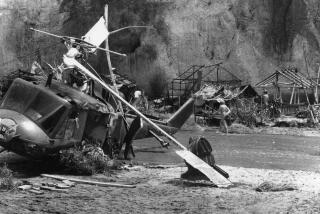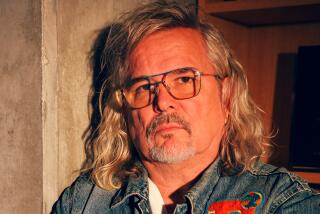A Killer Role, Courtesy of a Murderer
- Share via
PARK CITY, Utah — Anybody meeting Eric Bana after seeing him in the new film “Chopper” might be forgiven for expecting a loutish, paranoid sociopath. After all, he plays one to such perfection.
But those who haven’t seen the film but have watched him on Australian television over the years might expect some kind of comic impressionist. He’s made a handsome living doing that too.
Instead, sitting at a coffee shop here during the Sundance Film Festival, nursing the flu, he’s neither killer nor comedian-neither John Dillinger nor Will Farrell. He comes across as droll, nonthreatening and not especially stuck on himself, in keeping with the Australian cultural imperative of not taking yourself too seriously.
“A constant conflict for people who do a lot of traveling is trying to find the balance between an outrageous level of cynicism and negativity [in Australia] and an outrageous level of enthusiasm and positivity here,” the 32-year-old Bana says. “I kind of like a balance between the American way and the Australian way.”
This moderation is about as far as one can get from Mark “Chopper” Read, the real-life character he plays in the First Look film that opens Friday in Los Angeles. Chopper, who has been in and out of prison for half of his life-he’s now 47 and living with his wife and baby on a ranch in Tasmania-was notorious in Australia for the criminal exploits he chronicled in a series of best-selling books.
He claims to have committed 19 murders, though he says that most, if not all, of this mayhem was directed at people who had it coming to them. The Australian public was divided between those who admired his self-described vigilantism and those who abhorred his lawlessness.
“If you read his first couple books, he really sounds like he basically spends his time running around Melbourne beating up bad guys, stealing from crooks and giving money to people who needed it,” Bana says. “I remember reading his first book [‘From the Inside’] when I was still in school and thinking it wouldn’t be bad if there were more people out there like him, killing a rapist.”
Of course, there’s more to Chopper than that, and Bana makes clear that he wouldn’t have signed on to the project if it were intended to glamorize him or the violence he commits. Ultimately, Chopper is a sad case, unable to find peace anywhere, mainly because he can’t find any in himself. It has to be said, however, that there is a kind of Tarantinoesque appeal to Chopper’s mischief, as in a scene in which he harangues his girlfriend because she is upsetting her mother and then turns to her hysterical mother and head-butts her to shut her up. More than once he shoots somebody and then apologizes for it.
“It’s not hilarious because it’s funny,” Bana points out. “It’s hilarious because it’s ridiculous.”
*
Bana doesn’t play Chopper for laughs. Nor, surprisingly, does he play the tough guy. He says the easiest, showiest and most misguided approach would be to swagger. But if you’re Chopper Read, all you have to do is walk into a pub. Your notoriety has preceded you. The wariness of the people around you says it all. In fact, Bana met with Chopper in Tasmania and witnessed this phenomenon first hand. “We were out a couple of times, and you could see the anxiety level going up and up and up,” Bana recalls.
The real Chopper-his name comes from an Australian children’s story involving a big dog named Chopper-agrees with this approach. “I don’t act the tough-guy role,” he says by phone from Tasmania. “If a person is carrying several fully loaded handguns, why do they need to act tough? Just because you’re going to kill a man, there’s no reason for discourtesy. I’ve always been well-mannered and polite and courteous. I’ve always looked down my nose at people who swagger around the place. I don’t indulge in that sort of rubbish, and I don’t like people who do.”
Bana adds: “It’s also really interesting to sit opposite someone who has an inhumane tolerance for pain. I thought if him and I were locked in a room and I had nunchakus, a baseball bat, a knife, I would die. If you’re sitting opposite someone that you know is completely invincible, it’s a pretty rare thing.”
Chopper, who attributes this tolerance to a form of autism-a source of great embarrassment to him-says he endured 60 shock treatments when he was a kid. As an adult, he notes, “I’ve been stabbed seven or eight times, I’ve been smashed through the brain with a claw hammer, I’ve been ice-picked in the back of the neck and the heart, I’ve been shot, I’ve been run over several times, I’ve been baseball-batted near to death.” Because of this Terminator-like resilience, people thought he was crazy.
Bana says he didn’t feel threatened by Chopper because he knew Chopper wanted him to play the part. In fact, according to Bana and the film’s Australian director, Andrew Dominik, Chopper recommended him for it. Dominik, who had optioned Chopper’s work and had been searching for the right actor to play him, initially didn’t think much of the idea. After all, Bana was a fixture on Australian television, performing in a comedy show similar to “Saturday Night Live.”
What bothered Dominik wasn’t so much that Bana was a comedian, it was that he wasn’t an angry comedian. He was even nice to hecklers. How could a guy like that play a guy who would beat your brains in if you looked at him the wrong way?
Nevertheless, Dominik got an audition tape and then flew to Melbourne to meet with Bana. Though he came away sold on the actor, he had trouble convincing financiers to agree. Dominik says he could have made the movie years sooner had he gone with another, more famous actor, but Bana was just too good to let go. According to Chopper, this famous actor was none other than Russell Crowe, whom Chopper thought was wrong for the part. In addition, he says Crowe didn’t expect to have to audition for it. Chopper took a dim view of that. (A spokeswoman from Crowe’s office said the actor had “read the script and really liked it, but he passed on doing it. It never got to the point of an audition.”)
“It was a very good thing I was in jail when all of this nonsense was going on,” Chopper says grimly. “If I had been in the room, he would have bloody well auditioned, all right.”
Meanwhile, Bana, who by this time had his own television show, had to decide between making the show and making the movie. He quit the show, having been told that the production would begin in a month. That month stretched to two years as Dominik scrambled to find money. Bana had a wife and young child to support and says it was tough doing stand-up gigs on the road to keep from starving. Then, during production, he was given only a month to fatten up Robert De Niro-style to portray an aging, dissolute Chopper.
Apparently all of these sacrifices were worth it. The response to the film in Australia, where it was released last August, was overwhelmingly positive, astonishing the filmmakers, who thought they’d be roasted by critics who objected to Bana’s casting or thought Chopper was an unsavory subject. It’s one the highest grossing films in the country’s history. It also proved to be a calling card for Bana, who was then cast by director Ridley Scott (‘Gladiator’) as a special forces commando in his new film, “Black Hawk Down,” about two American helicopters that went down during the conflict in Somalia.
And what does Chopper think of Bana’s performance?
“I thought it was a very good impersonation,” he says judiciously.
“He looked more like me than I did. It’s a very strange feeling to see yourself as other people see you. I think everybody would learn something about themselves if they saw themselves like that. I learned that in spite of all the laughter and the fun and games I had years ago that I don’t think I was a very nice person. When I sat in the theater, everyone was laughing their heads off. The only person who wasn’t laughing was me.”
More to Read
Only good movies
Get the Indie Focus newsletter, Mark Olsen's weekly guide to the world of cinema.
You may occasionally receive promotional content from the Los Angeles Times.










